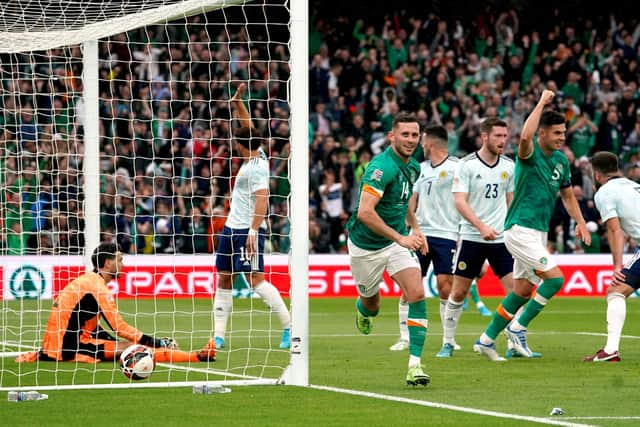Scotland suddenly look very ordinary again as Republic of Ireland deliver damaging blow to Steve Clarke and Co
Just two wins in their last 17 competitive fixtures. Only four in Stephen Kenny’s entire 25-match managerial reign. No victories at all in a dozen Nations League matches. Put it this way, Republic of Ireland – and perhaps more specifically, their manager – were in dire need of a win. Scotland were expected to pile on the pressure while maintaining a 100 per cent win record in Group B1.
Of course, these circumstances were ripe for a major Scottish disappointment. And make no mistake, this is what unfolded.
Advertisement
Hide AdAdvertisement
Hide AdTwo goals down within 30 minutes was an even worse fate than those Scots made nervous by the gloom surrounding the Irish camp had feared.


The hosts had already equalled their entire Nations League goal output. It might stand as the worst opening half from Scotland since the infamous defeat in Kazakhstan that derailed the regulation qualifying campaign for Euro 2020 when it had barely started.
That was the time Scotland flew into a city called Astana and left one that had changed its name overnight to Nur-Sultan. Similarly, Steve Clarke’s side flew into Dublin on a new wave of hope following the seemingly restorative properties of a 2-0 win over Armenia. They will fly out tomorrow bound for the return fixture against the Armenians feeling like a very different and surely slightly beleaguered team.
This was three going on five or six. Many Scottish fans waved the players away in disgust as they approached them after the final whistle.
Indeed, it probably should have been 4-0. Grant Hanley hooked second-half substitute Scott Hogan’s back-post header from the line but the ball looked as if it could well have been over. The game was held-up shortly afterwards as a VAR check was conducted. No goal, it rather surprisingly ruled.
Scotland were already on the ropes having just been McFaddened. Michael Obafemi pulled off an audacious shot that was very similar to the one the former Scotland striker so memorably scored to win a Euro 2008 qualifier in Paris against France.
Billy Gilmour lost possession in midfield after good harrying work from Troy Parrott and Obafemi steadied himself before rifling a right-footed shot towards Craig Gordon from almost 30 yards that moved wickedly in the air. Like France goalkeeper Mickael Landreau in the McFadden example, Gordon will still feel disappointed to have beaten from such range.
Even the half-time score could have been even worse for Scotland. Gordon pushed a corner onto the bar. He also tipped a strong Shane Duffy header over.
Advertisement
Hide AdAdvertisement
Hide AdBut as is so often the case in games where the scoreline seems to indicate one-way traffic, it could have been so much better for Scotland. And perhaps should have been. It was not black and white. Scotland defended poorly, yes. But they had chances to score and send the game off in a very different direction.
Sadly, John McGinn stands accused in the dock once more. The Aston Villa midfielder spoke for the first time on Friday about the miss against Ukraine that still haunts him. He now has another couple to provoke night sweats.
He had the chance to put Scotland ahead after 13 minutes and severely dishearten the hosts, who had started brightly. The loss of a goal in this situation would have been especially dispiriting because Ireland were entirely responsible for coughing up the chance with imprecise play out of defence.
Goalkeeper Caoimhin Kelleher passed to Duffy on his right and the right wing-back only shovelled the ball into Ryan Christie’s path.
The forward nudged it wide to McGinn who could only direct a tame shot from the edge of the box towards Kelleher, who gathered. He had another big, perhaps more glaring opportunity to score 13 minutes later from roughly the same position after another lay-off by Christie.
Scotland were already one down by this point. The goal had been coming and stemmed from Scott McKenna getting the slightest of touches to a cross from the left from James McClean that seemed bound for Obafemi’s head. The seeming certain goal was only delayed another few moments. McClean whipped in another dangerous cross from the corner, Duffy broke off at the back post to direct the ball across the goalmouth and Preston North End’s Alan Browne bundled it over. They all count. And Ireland had reached the point where even this somewhat unsightly goal felt like a gift from the gods.
The next one was rather more special, as was their third. The game started to run away from the visitors after 27 minutes when Obafami, the outstanding performer in the 55 minutes or so he was on the pitch, clipped a brilliant, curling ball into the danger area for Parrott, who had out-stripped Anthony Ralston and Jack Hendry, to run on to and deftly nod beyond Gordon.
It was a game too far for a lot of these tired-looking Scottish players. Unfortunately, they have another one as soon as Tuesday in what promises to be the suffocating heat of Yerevan.
Advertisement
Hide AdAdvertisement
Hide AdClarke made a triple substitution just before the hour mark in recognition of this now very awkward-looking assignment.
McGinn, Christie and Che Adams, who looked out of touch all evening, departed, with Stuart Armstrong, dropped following Wednesday, Ross Stewart and Jacob Brown coming on for what was an academic exercise. Gilmour had already replaced Hendry at half-time.
McKenna later made way for John Souttar, whose omission from the starting line-up had raised eyebrows. But it was about a lot more than just this personnel decision. Are chickens coming home to roost for Clarke and his weary band of players? Scotland suddenly look very ordinary again.